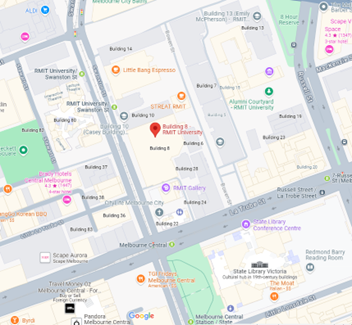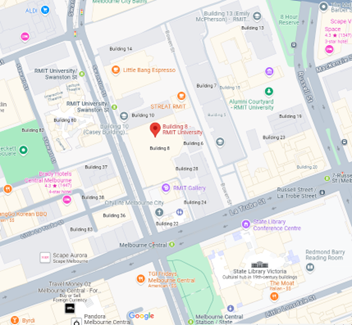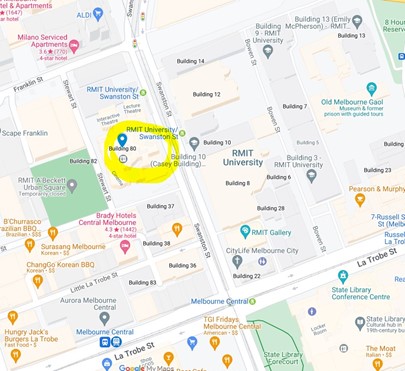21st Century Science: RMIT Masterclasses for National Science Week 2024
Event description
Join us for 21st Century Science: RMIT Masterclasses for National Science Week 2024!
Join us for an inspiring series of public science masterclasses at RMIT University to celebrate National Science Week 2024. The RMIT Science Masterclasses explores the cutting-edge advancements and transformative impacts of modern science on society. Over the course of the week, RMIT's leading researchers and educators will deliver engaging presentations designed to ignite curiosity and foster a deeper understanding of contemporary scientific phenomena.
Event Details
Day One:
Speaker: Dr Julie Currie
Title: Space Weather: More than just a pretty sky
Description: In May this year many were lucky enough to look at the sky and see an amazing display of colour dancing through the night. The next night Melbourne beaches were lined with people excitedly hoping to witness the colourful display but were only treated to the cold of a Melbourne winter’s night. The aurora is one of the most well-known effects of Space Weather, but other than predicting what nights we want to stand rugged up on the beach, why do we care? The truth is that space weather is becoming exponentially more important, and we increase our reliance on modern technologies. The largest space weather event ever recorded was the Carrington event of 1859 where auroras were observed as close to the equator as Hawaii and central America. During the Carrington event, telegraph wires were disrupted throughout North America and Europe. In 1859 people wouldn’t even be able to comprehend the technology of today, and how vital it is to every part of our day. A similar space weather event would have catastrophic consequences. This talk looks at a history of space weather events and the impacts large space weather events have on our ever-increasing technology.
Bio: Julie Currie is a lecturer in the School of Science at RMIT University. She completed her PhD in the Centre for Space Physics at the University of Newcastle, Australia in 2018. Julie’s research area is Space weather with a PhD that focussed on the dynamics of the mid-high latitude ionosphere as detected by large ionospheric radars and satellite data. Since moving to RMIT Julie has focussed on the effect of plasma disturbances in the equatorial region. These disturbances impact satellite communications and investigating them using both ground-based and space-based GPS receivers is crucial in improving predictions of space weather impact forecasts.
Location: RMIT Mega Flex 3 - Building 8, Level 4, Room 13 - 360 Swanston St, Melbourne VIC 3000

Date: Monday 12 August 2024
Time: 3:00pm - 5:00pm (lecture will run from 3.30pm - 4.30pm)
Day Two:
Speaker: Dr Alice Johnstone
Title: Is statistics the answer to species survival?
Description: The life expectancy for Australians has been steadily increasing each year, yet the 2020-2022 estimate showed the first decrease of 0.1 year for both males and females [1]. COVID-19 became the third leading cause of mortality, behind ischaemic heart disease and Dementia. Without a better understanding of the impacts of diseases, or their causes, the trend of improvement in life expectancy of humans may begin to reverse. This talk will discuss the ways in which statistics is assisting biologists to understand the changes that occur at the molecular level with disease or infection, which is known as bioinformatics. Through the analysis of these large data sets created by sequencing and measuring genetic information we can advance our understanding to inform the development of potential treatments, alleviate symptoms or reverse damage. Applications from obesity, injury and development will be discussed. [1]Australian Bureau of Statistics. Life expectancy [Internet]. Canberra: ABS; 2020-2022 [cited 2024 July 23]. Available from: https://www.abs.gov.au/statistics/people/population/life-expectancy/latest-release.
Bio: Dr Alice Johnstone is a Senior Lecturer in Statistics in the Mathematical Sciences Discipline of the School of Science at RMIT. Dr Johnstone is the Program Manager for undergraduate statistics at RMIT and has been responsible for teaching courses across different undergraduate and postgraduate programs including the Master of Analytics. Dr Johnstone’s research expertise is in the applications of statistics to biological problems. Her research spans from public health, including large, longitudinal clinical studies, through to smallest aspects of biology at the molecular level. Dr Johnstone’s current work focusses on RNA expression, also known as transcriptomics, to identify the patterns of biological interest between conditions, treatments or diseases.
Location: RMIT Mega Flex 3 - Building 8, Level 4, Room 13 - 360 Swanston St, Melbourne VIC 3000

Date: Tuesday 13 August 2024
Time: 3:00pm - 5:00pm (lecture will run from 3.30pm - 4.30pm)
Day Three:
Speaker: Dr Julia Low
Title: Why can’t we agree on dinner?
Description: Have you ever wondered why we can't just agree on what to eat for dinner? Well, our food choices and how we sense and interact with food can be influenced by many factors, including our genetics, emotions, personalities, taste buds, diets, and even the environment where we eat. In this masterclass, we will discuss how the eating environment may influence your choice of food. Then, we'll take a virtual adventure 400 km up to orbit and talk about how astronauts perceive their food in space and how the eating environment plays a role.
Bio: Dr Julia Low is a Senior Lecturer in Food and Nutrition, specialising in sensory and consumer science. She has a multidisciplinary background in psychology, nutrition, and food science. Dr. Low is particularly interested in how people living and working in extreme environments, such as space, experience sensory perception and make food choices. She is also focused on designing meaningful food experiences to help people enjoy their meals. Currently, she leads a team of four PhD students and co-leads the RMIT Space Industry Hub in life sciences.
Location: RMIT Building 80 - Building 80, Level 4, Room 006 - 435-457 Swanston St, Melbourne VIC 3000

Date: Wednesday 14th of August 2024
Time: 3:00pm - 5:00pm (lecture will run from 3.30pm - 4.30pm)
This is a free, in person event. RSVP now to secure your spot!
Tickets for good, not greed Humanitix dedicates 100% of profits from booking fees to charity
